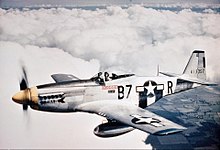
From their inception, North American Aviation has sculpted an impressive legacy within the aviation industry. Known for their iconic aircraft models, each one holds an interesting background story filled with remarkable milestones and notable features. Let's take an exhilarating ride through the fascinating history, design, and performance of their famous aircraft models.
HISTORY: The Flight Path to Glory
The P-51 Mustang
The P-51 Mustang, a legend of World War II, was first introduced in 1940. It was created in an astounding 117 days as a response to the British government's urgent need for a long-range, high-altitude fighter. Its innovation and notable contribution to the Allied victory make it a central figure in the annals of aviation history.
The B-25 Mitchell
The B-25 Mitchell was another monumental aircraft introduced in 1940. Best known for its part in the daring Doolittle Raid, a surprise attack on Tokyo during WWII, this medium bomber showcased the bravery and resourcefulness of the American forces.
The T-6 Texan
Introduced in 1937, the T-6 Texan played a key role as an advanced trainer aircraft. Almost all Allied pilots received their initial fighter training in this model, making it a cornerstone in pilot training history.
DESIGN: Engineering Excellence
P-51 Mustang
The P-51 Mustang has a wingspan of 37 feet, a length of 32 feet, a weight of 12,100 pounds, and can accommodate one pilot. Its unique design includes a laminar-flow wing that reduces drag and a supercharged V-12 engine to boost its performance.
B-25 Mitchell
The B-25 Mitchell has a wingspan of 67 feet 7 inches, a length of 52 feet 11 inches, and weighs approximately 35,000 pounds. It can seat six crew members. Its twin-engine design and impressive firepower earned it a fearsome reputation.
T-6 Texan
The T-6 Texan has a wingspan of 42 feet, a length of 29 feet, and a weight of 5,617 pounds. It can accommodate two crew members. Its responsive handling and complex systems made it the ideal training aircraft.
PERFORMANCE: Setting the Skies on Fire
P-51 Mustang
With a top speed of 437 mph, a range of 1,650 miles, a maximum altitude of over 41,000 feet, and superior fuel efficiency, the Mustang was a pivotal game-changer in long-range bomber escort duties during WWII.
B-25 Mitchell
The Mitchell had a top speed of 272 mph and a range of 1,350 miles. It could reach a maximum altitude of 24,200 feet. The aircraft's robust performance attributes made it an effective tool in a variety of roles.
T-6 Texan
The Texan, while not as fast or as high-flying as its counterparts, with a top speed of 208 mph and a range of 730 miles, served a vital role in adequately preparing pilots for the performance characteristics of high-speed combat aircraft.
OPERATORS: Giants Among Men
P-51 Mustangs were flown by numerous air forces around the globe, including the Royal Air Force and the United States Army Air Forces. Today, they are prized possessions for warbird collectors.
The B-25 Mitchell served with over a dozen air forces worldwide. In the U.S, it is known as the only military aircraft to be named after an individual – General Billy Mitchell, a pioneer of U.S military aviation.
The T-6 Texan was and continues to be a popular choice for flight training schools across the world.
To conclude, North American Aviation's aircraft models have significantly contributed to aviation history. Their remarkable performance characteristics, design excellence, and momentous roles in various operations make them unforgettable icons in the sky.
Please share this post with fellow aviation enthusiasts and those interested in the riveting story of North American Aviation's legendary aircraft models.
| Model | Introduction | Wingspan | Length | Weight | Top Speed | Range | Altitude |
|---|---|---|---|---|---|---|---|
| P-51 Mustang | 1940 | 37 ft | 32 ft | 12,100 lb | 437 mph | 1,650 mi | 41,000 ft |
| B-25 Mitchell | 1940 | 67 ft 7 in | 52 ft 11 in | 35,000 lb | 272 mph | 1,350 mi | 24,200 ft |
| T-6 Texan | 1937 | 42 ft | 29 ft | 5,617 lb | 208 mph | 730 mi | 24,500 ft |
This article uses material from various web resources and Wikipedia article, released under the Creative Commons Attribution-Share-Alike License 3.0.

